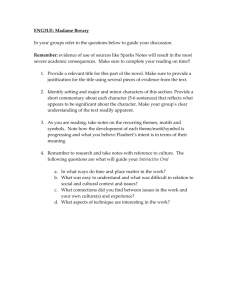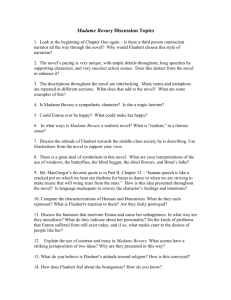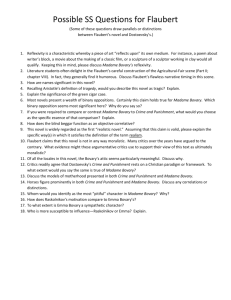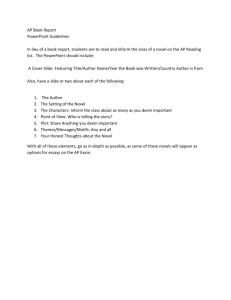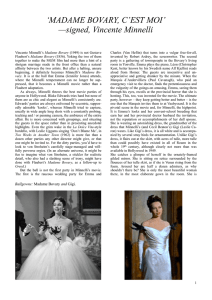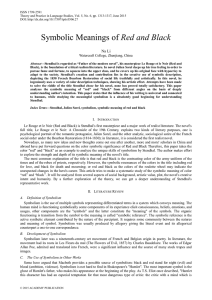Readers in the Texts
advertisement
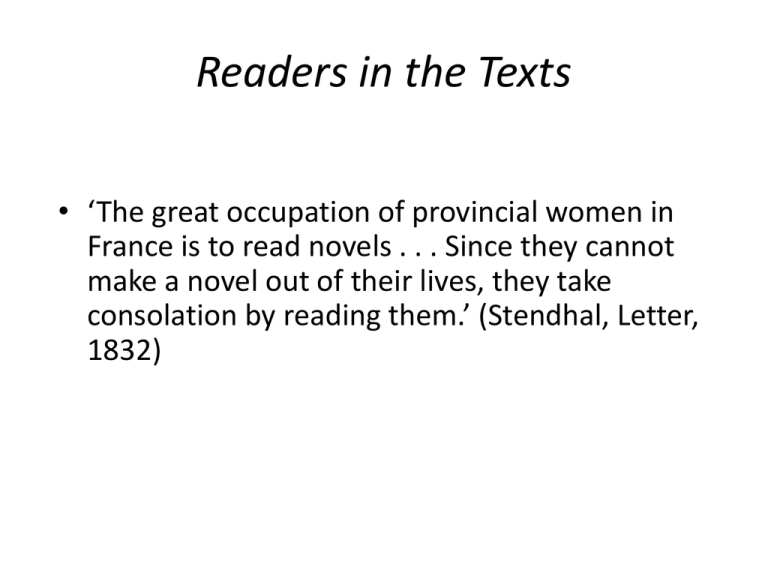
Readers in the Texts • ‘The great occupation of provincial women in France is to read novels . . . Since they cannot make a novel out of their lives, they take consolation by reading them.’ (Stendhal, Letter, 1832) • Growth, organisation and institutionalisation of reading as a cultural and educational force in the 19th century • Theme of reading and prevalence of readers in the novel European novel • Reading as a determining activity - a key to understanding and also building (moral and literary) character • Reading in the text as a subversive way to think of Realism of the text • Reading as a psychological, private phenomenon as well as a public one, and the relation between the two. • Reading as cure and disease – as good and bad for the health • • This existence of a mass of lower-class readers was a new and troubling social phenomenon. Together with the prospect of an increase in untutored female reading, it was a source of anxiety for clerics, educators, liberals and politicians. France, it was thought, was reading too much, in the sense that a mass of inexperienced consumers was reading indiscriminately and without guidance. They were considered innocent readers, potentially easy prey for unscrupulous publishers and ruthless propagandists. Workers and peasants could be lured by undesirable ideas such as socialism, legitimism or Bonapartism – the name of the demon changed according to the faith of the polemicist. The problem was defined not only in terms of what the new readers read, but also in terms of how they read. They would read unwisely, it was feared, unable to distinguish falsehood, truth from fantasy. They might be tempted (in the case of women) by erotic desire and impossible romantic expectations. They would read superficially instead of purposefully without mediating and digesting their texts. The dangers, both moral and political, posed by new readers consuming a mass of cheap popular literature, were disturbing. In the debates on these issues, the social neuroses of the bourgeois were revealed. The anxious dreams of the nineteenth century bourgeois were peopled by all those who threatened his sense of order, restraint and paternal control. Martin Lyons, Readers and Society in Nineteenth-Century France (Palgrave, 2001, p.11) When M. de Rênal was in town, which was a frequent occurrence, he plucked up the courage to read. Soon, instead of reading at night, taking care at that to conceal his lamp inside an overturned vase, he felt able to indulge in sleep. During the day, between the children’s lessons, he would come to these rocks with the book which alone ruled his conduct and was the object of his delight. It was at once a source of happiness, ecstasy and consolation to him in moments of discouragement. Certain things which Napoleon says about women, and a number of passages discussing the merits of novels fashionable during his reign, now gave Julien for the very first time the kind of thoughts that any other young man of his age would have long since been entertaining. […] One evening, Julien was talking excitedly, deriving intense enjoyment from the pleasure of expressing himself eloquently, and to young women too. As he gesticulated, he touched Mme. de Rênal’s hand which was resting on the back of one of those painted wooden chairs which are often put in gardens. The hand was withdrawn very soon; but Julien decided it was his duty to ensure that this hand would not be withdrawn when he touched it. The idea of a duty to carry out, and a risk of suffering ridicule or rather a feeling of inferiority if he failed in it, immediately removed all pleasure from his heart. Stendhal, Le Rouge et Le Noir (1830) [Binet] was really very good-natured, even raising no objection one day when the pharmacist advised Charles to take Emma, for a change, to the theatre in Rouen, to see the famous tenor Lagardy. When Homais, amazed at this restraint, asked for his opinion, the priest declared that he considered music less dangerous to morality than literature. But the pharmacist leapt to the defence of letters. The theatre, he claimed, helped attack prejudices, and, under the guise of pleasure, inculcated virtue. ‘Castigat ridendo mores, Monsieur Bournisien! Take, for example, the majority of Voltaire’s tragedies; they’re very cleverly sprinkled with philosophical reflections, which make them an invaluable resource for instructing the common people in morality and diplomacy.’ ‘Well,’ said Binet, ‘I once saw a play called Le Gamin de Paris, where there’s this character – an old general – that’s absolutely tip-top! He really gets the better of a rich young fellow who’s seduced a working girl, and in the end . . .’ ‘Of course!’ went on Homais, ‘there’s bad literature just as there’s bad pharmacy; but to condemn in its totality the most important of the fine arts is in my opinion a dreadful blunder, a barbarous idea, worthy of that infamous age that imprisoned Galileo.’ ‘I quite agree’, rejoined the priest, ‘that there are some good writers who produce good works; nevertheless, simply the fact that people of opposite sex are gathered together in a charming auditorium that’s ostentatiously decorated with worldly luxuries-and then there’s the heathenish costumes, the greasepaint, the footlights, the effeminate voices-all these things cannot fail in the end to engender a certain degree of free-thinking, and encourage licentious ideas and impure desires. Such, at any rate, is the opinion of the Church Fathers. After all, ‘he added, his voice suddenly assuming an exalted tone, as he rolled himself a pinch of snuff, ‘if the Church has condemned theatrical shows, it is because she knows best. Madame Bovary, II, XXIV Being not very well versed in these matters, beyond a certain point [Binet] wrote to Monsieur Broulard, bookseller to the archbishop, asking for something decent for one of the fair sex with a good head on her shoulders. The bookseller […] threw together a parcel of everything recent in the way of pious literature. There were little question and answer manuals, dogmatic pamphlets in the style of de Maistre and various novels in pink bindings and a sugary style, churned out by troubadour seminarists….. Madame Bovary II, XXIV [Emma] often suffered from giddy spells, and one day she even spat up some blood. As Charles was fussing over her, obviously worried: ‘Bah!’ she said; ‘Whatever does it matter?’ Charles retreated into his study where, seated in his office chair under the phrenological head and leaning his elbows on the table, he wept. Then he wrote begging his mother to come and they had long discussions together, about Emma. What ought they to do? What could they do, since she refused any kind of treatment? ‘Do you know what your wife really needs?’ resumed Madame Bovary senior. ‘What she needs is hard work, manual labour. If she was obliged to earn her living like so many have to do, she wouldn’t suffer from these vapours, which come from all these ideas she fills her head with, and living such an idle life.’ ‘Still, she’s always busy,’ replied Charles. ‘Huh! Busy! But doing what? Reading novels, wicked books, books against religion, full of speeches from Voltaire that make fun of priests. This is no laughing matter, my poor boy; someone who has no religion always comes to a bad end.’ So it was decided that Emma was to be prevented from reading novels. Madame Bovary, II, VII The control of the imagination is umbilically linked to the history of the novel. Insofar as the question of control is a formal one concerning when fiction is acceptable and what its relation may be to factual history, it also becomes an epistemological one [i.e. concerned with what knowledge is, what constitutes knowledge] concerning the nature of truth and the real with which “serious” discourses would be obliged to correspond. Costa Lima, ‘The Control of the Imagination and the Novel’ in Franco Moretti (ed.) The Novel, Vol I: History, Geography and Culture “There are bookish dreams here” (Porfiry) “In his article all men are divided into ‘ordinary’ and ‘extraordinary.’ Ordinary men have to live in submission, have no right to transgress the law, because, don’t you see, they are ordinary. But extraordinary men have a right to commit any crime to transgress the law in any way, just because they are extraordinary. That was your idea, if I’m not mistaken?” “What do you mean? That can’t be right?” Razumikhin muttered in bewilderment. Raskolnikov smiled again. He saw the point at once, and knew where they wanted to drive him. He decided to take up the challenge. “That wasn’t quite my intention,” he began simply and modestly. “Yet I admit that you have stated it almost correctly; perhaps, if you like, perfectly so.” (It almost gave him pleasure to admit this.) “The only difference is that I don’t contend that extraordinary people are always bound to commit breaches of morals, as you call it. In fact, I doubt whether such an argument could be published. I simply hinted that an ‘extraordinary’ man has the right . . . that is not an official right, but an inner right to decide in his own conscience to overstep . . . certain obstacles, and only in case it is essential for the practical fulfilment of his idea (sometimes perhaps, of benefit to the whole of humanity). You say that my article isn’t definite; I am ready to make it as clear as I can. (Crime and Punishment, part 3, Ch. 5) “He murdered, and he murdered two people for a theory” (Porfiry) Mikhail Petrashevsky (1821-66) Nikolai Chernyshevsky (1828-89) What Is to Be Done? (1863) “He murdered, and he murdered two people for a theory” (Porfiry) “Under his pillow there was a copy of the New Testament. Mechanically, he took it out. This book was hers, was the same one from which she had read to him of the raising of Lazarus. At the outset of his penal servitude he had thought she would torment him with religion, talk about the New Testament an press books on him. Much to his great surprise, however, she never once offered him a New Testament. He himself had asked for it not long before he had fallen ill, and she had brought him her copy in silence. Until now, he had never opened it. Even now he did not open it, but a certain thought flickered through his mind: “What if her convictions can now be mine, too? Her feelings, her strivings, at least…? (Crime and Punishment, Epilogue, Chapter 2)


